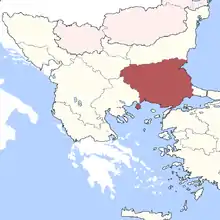| Eyālet-i Edirne | |||||||||||
|---|---|---|---|---|---|---|---|---|---|---|---|
| Eyalet of the Ottoman Empire | |||||||||||
| 1826–1867 | |||||||||||
 The Adrianople Eyalet in the 1850s | |||||||||||
| Capital | Edirne | ||||||||||
| Area | |||||||||||
| • Coordinates | 41°40′N 26°34′E / 41.667°N 26.567°E | ||||||||||
| Population | |||||||||||
• 1844 | 1,200,000[1] | ||||||||||
| History | |||||||||||
• Established | 1826 | ||||||||||
• Disestablished | 1867 | ||||||||||
| |||||||||||
| Today part of | Turkey Greece Bulgaria | ||||||||||
The Eyalet of Adrianople or Edirne[2] or Çirmen[3] (Ottoman Turkish: ایالت ادرنه; Eyālet-i Edirne)[4] was constituted from parts of the eyalets of Silistra and Rumelia in 1826.
It was one of the first Ottoman provinces to become a vilayet after an administrative reform in 1865, and by 1867 it had been reformed into the Vilayet of Adrianople.[5]
Administrative division
The eyalet comprised almost all of the historical geographical region of Thrace, and comprised the following subdivisions (sanjaks or livas):[3][6]
- Sanjak of Nevahi-i Erbaa (capital: Çatalca)
- Sanjak of Tekfürtaği (Rodosto) or Vize
- Sanjak of Gelibolu (Gallipoli)
- Sanjak of Edirne (Adrianople)
- Sanjak of Filibe (mod. Plovdiv)
- Sanjak of Islimiye (mod. Sliven) or Eski Zagra (Stara Zagora)
The sanjaks were further subdivided into 50 kazas or prefectures.[3]
References
- ↑ Michael R. Palairet (2003-11-13). The Balkan Economies C.1800-1914: Evolution Without Development. Cambridge University Press. p. 9. ISBN 978-0-521-52256-4. Retrieved 2013-06-01.
- ↑ The English Cyclopaedia: Geography By Charles Knight
- 1 2 3 Konortas, Paraskevas. Αδριανουπόλεως Βιλαέτιον προ του 1864. Θρακικός Ηλεκτρονικός Θησαυρός (in Greek). Retrieved 2 March 2013.
- ↑ "Some Provinces of the Ottoman Empire". Geonames.de. Archived from the original on 28 September 2013. Retrieved 25 February 2013.
- ↑ Almanach de Gotha: annuaire généalogique, diplomatique et statistique. J. Perthes. 1867. pp. 827–829. Retrieved 2013-06-01.
- ↑ The three eras of Ottoman history, a political essay on the late reforms of ..., p. 75, at Google Books By James Henry Skene
This article is issued from Wikipedia. The text is licensed under Creative Commons - Attribution - Sharealike. Additional terms may apply for the media files.